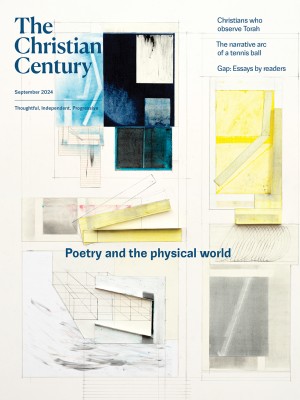September 29, Ordinary 26B (Psalm 124)
When the Spirit moved among us, we heard the tongues of angels.
Psalm 124 is one of a small collection of psalms identified as songs of ascent. Or, as commentator John H. Hayes calls them, “songs of pilgrimage.” These are liturgical pieces intended for public acts of worship, to be sung or recited while the congregation makes its way to its gathering place. They begin with a call from the worship leader, followed by the response of the congregation. In Psalm 124 we catch a glimpse of something ancient and profound: God’s people testifying.
I grew up in the Pentecostal tradition. My dad was a preacher in the Assemblies of God. Between my birth and my freshman year of high school I attended four congregations. In each of them, testimony time was a regular part of our worship. It usually happened at Sunday evening services and Wednesday prayer meetings. When the time felt right, my dad would invite people to stand and tell what God was up to in their lives.
Read our latest issue or browse back issues.
Sometimes the testimony came in the form of a prayer request to the God who answered. Often it came in words of praise and thanksgiving. A deliverance. A healing. A miraculous recovery. A certain death avoided.
Testimonies were always followed by shouts of “Praise you Jesus!” “Glory!” “Thank you God, thank you God!” And when the Spirit moved among us, we’d hear the tongues of angels. Our faith was never silent. It was always spoken aloud. Ours was a hearts-on-our-sleeves religion.
Naming blessings was a way of reminding ourselves that we were not alone in the world. If Brother John got a better-than-expected medical report, we heard about it at the next opportunity. And we praised the Lord with him. If Sister Rose had a new grandbaby, we joined her in singing hallelujah.
With every word of testimony, we were reminded that God was alive and well and looking after us. We were tended by a gentle shepherd. Offering thanks and praise was as natural to us as writing a thank-you note. It was polite. But it also reminded us that we were in a relationship with the God of the universe. How could we be silent when we felt God’s hand touch our lives?
In my Mennonite congregation we take time in worship to share joys and concerns. While not as lively as the Pentecostal testimony times I witnessed as a kid, our sharing provides the same kind of nourishment for the community. We speak, we name God’s presence, we ask for God’s healing, and we give thanks. In the process we are reminded that if God was present yesterday, we can have confidence that God will be present tomorrow. Thanks be to God!
Psalm 124 is a hymn of recollection. It looks back over time in search of evidence of God’s presence in and with God’s people, and then it identifies that presence as God’s. There is an intention to the practice. Not only seeing what happened but naming it as God’s handiwork, God’s provision, God’s intervention. Recollection without the naming is merely a collection of facts from the past. The naming transforms those facts into testimonies that can nourish and sustain one’s faith. The past informs the present by offering hope for the future.
The dual movements of recollection and naming remind me of the examen prayer from Ignatian practice. Each evening you look back over the day, seeking those moments in which God felt especially near. For those moments you give thanks. And you may also identify moments when God felt far away. For those moments you invite God’s Spirit to assist your understanding, to open your eyes, and to forgive your lack of vision.
In my experience the gathering of moments becomes an act of worship as I notice and name God’s presence with me. A testimony told to myself in God’s presence. Just like in a worshiping community, the testimony issues in expressions of gratitude and praise. Today I was not alone. Today I was cared for and attended by the Spirit of God. Today God walked with me. Hallelujah!
Commentators note that Psalm 124 does not specify a particular instance of divine rescue from Israel’s enemies. Its reach is broader than that, encompassing the history of a nation under constant threat from a multitude of enemies. The images shift from the anger of enemies, to raging waters, to the teeth of a predator, to the snare of the fowler.
Surrounded by dangers of every kind, the people are still alive to testify. Because God saved them. God rescued them. No one else could have done so. And so the people sing together as they walk toward the place of worship: Our help is in the name of the Lord, who made heaven and earth.





